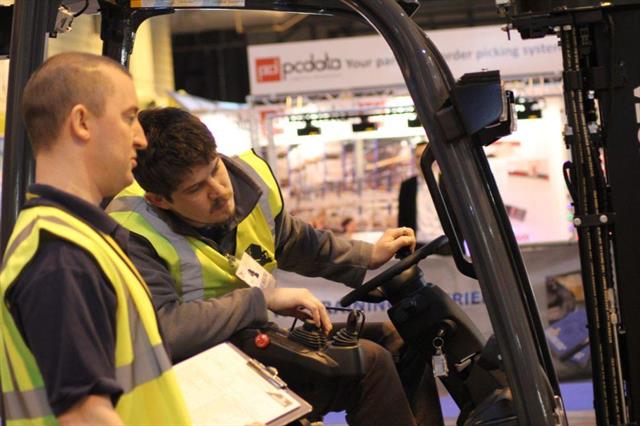 Those responsible for the day-to-day operations are required by law, as employers, to ensure the health, safety and welfare of their employees.
PHOTO: RTITB |
Nick Welch is a regional executive of RTITB, the largest forklift training accrediting body in the UK and Ireland, recognised by the HSE, HSA and HSENI.
In a previous article, figures from the 2010/11 Workplace Transport finalised summary revealed that nine employees were killed, that there were 438 major and 1204 over three-day injuries and that transportation and storage was the riskiest sector for workplace transport with the highest number and rate of injuries.
Against this backdrop and in an industry constantly under pressure to get the goods out and costs down, the cost of deaths, injuries and accidents on such a scale must be very substantial, not just in terms of human suffering but as a percentage of an operational budget. Those responsible for the day-to-day operations are required by law, as employers, to ensure the health, safety and welfare of their employees.
The main pieces of legislation applying to the use of forklifts are:
* Health and Safety at Work etc Act 1974 (HSW Act)
* Lifting operations and lifting equipment regulations 1998 (LOLER)
* Provision and use of work equipment regulations 1998 (PUWER)
* Control of Substances Hazardous to Health Regulations 2002(COSHH)
* Construction (Design and management) Regulations 2007
* Management of health and safety at work regulations 1999
* Workplace (Health, Safety and Welfare) regulations 1992
You are legally required to consult all your employees before making health and safety decisions. Issues you consult on could include the health and safety risks and the work they do, how risks are controlled and the best ways of providing information and training.
The PUWER regulations require that users, supervisors and managers have received adequate training for the purposes of health and safety, including methods which may be adopted when using work equipment, any risks which such use may entail and precautions to take.
LOLER indicates that you should make sure that every lifting operation involving a forklift is properly planned by a competent person. This is usually the operator for most forklift work, so they should have the appropriate training, knowledge and expertise.
The need to monitor forklift operators and operations is clear both from a health and safety law and business need perspective. Those who are to do the monitoring need to know what "good" looks like and may not be qualified and experienced forklift operators themselves. Accrediting bodies such as RTITB offer training tailored to the needs of those responsible for monitoring forklift operations.
If you are to comply with LOLER and make sure that every lifting operation involving a forklift is properly planned by a competent person, then you will need systems in place to ensure that operators are and remain competent. Training alone will not ensure competence, this will develop with experience. Basic operator training covers standard situations and HSE would not expect an operator to carry out complex lifts in difficult conditions without further training. Even experienced operators need supervision if they have to lift an abnormal load, or lift in potentially hazardous conditions.
Trained and experienced lift truck operators need to be routinely monitored in the workplace in order to make sure they continue to operate lift trucks safely, without damaging goods and equipment, and you have an obligation under the HSW Act to provide adequate supervision.
You can identify the need for further training using a formal monitoring and assessment process, carried out by a suitably trained and experienced supervisor or instructor, timetabled to make sure that assessment is carried out at reasonable intervals. Monitoring/assessment should be recorded in the operator's personal record together with any identified need for refresher training. Successful completion of refresher training and assessment should be linked to continued authorisation to operate lift trucks.
Regular refresher training and retesting ensures operators maintain good driving habits, learn new skills and reassess their abilities. Refresher training and assessment is also appropriate where operators have not used lift trucks for some time, are occasional users, appear to have developed unsafe working practices, have had an accident or near miss, or have changed their working practices or environment.
While there is no specific time period after which you need to provide refresher training and assessment, many employers and accrediting bodies have decided that refresher training and retesting should be provided at least three yearly to try and make sure operators remain competent. This approach does not remove the need for regular performance monitoring during the period as operators may develop unsafe practices and behaviour.
Forklifts are widely used in industry and sadly they are involved in about a quarter of all workplace transport accidents. The deaths and injuries caused ruin lives and businesses. Even if an incident does not cause injury, it almost certainly results in costly damage to lift trucks, buildings, fittings and goods. Regular monitoring and refresher training are essential tools in the battle to reduce costly damage, injury and death, and a key component in changing operator behaviour and emphasising a culture of safe operation.
Further information on monitoring and refresher training is available from the accrediting bodies listed on the HSE website. The HSE code of practice for rider-operated lift trucks L117 is also free to download from the HSE.